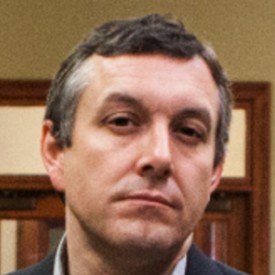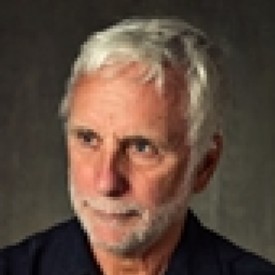Michael Long is not the typical neuroscience guy. He was trained as a physicist, but is primarily a writer. He coauthored the international bestseller The Molecule of More. As a speechwriter, he has written for members of Congress, cabinet secretaries, presidential candidates, and Fortune 10 CEOs. His screenplays have been performed on most New York stages. He teaches writing at Georgetown University.
What’s the big idea?
Dopamine is to blame for a lot of your misery. It compels us to endlessly chase more, better, and greater—even when our dreams have come true. Thanks to dopamine, we often feel restless and hopeless. So no, maybe it’s not quite accurate to call it the “happiness” molecule, but it has gifted humans some amazing powers. Dopamine is the source of imagination, creativity, and ingenuity. There are practical ways to harness the strengths of our dopamine drives while protecting and nurturing a life of consistent joy.
Below, Michael shares five key insights from his new book, Taming the Molecule of More: A Step-by-Step Guide to Make Dopamine Work for You. Listen to the audio version—read by Michael himself—in the Next Big Idea App.

1. Dopamine is not the brain chemical that makes you happy.
Dopamine makes you curious and imaginative. It can even make you successful, but a lot of times it just makes you miserable. That’s because dopamine motivates you to chase every new possibility, even if you already have everything you want. It turns out that brain evolution hasn’t caught up with the evolution of the world.
For early humans, dopamine ensured our survival by alerting us to anything new or unusual. In a world with danger around every corner and resources hard to acquire, we needed an early warning system to motivate us even more. Dopamine made us believe that once we got the thing we were chasing, we’d be safer, happier, or more satisfied. That served humans well, until it didn’t.
Now that we’ve tamed the world, we don’t need to explore every new thing, but dopamine is still on duty, and it works way out of proportion to the needs of the modern world. Since self-discipline has a short shelf life, I share proven techniques that don’t rely on willpower alone.
2. Dopamine often promises more than reality can deliver.
When we have problems obsessing with social media, the news, or when we’re doing excessive shopping, we feel edgy and restless. This is because dopamine floods us with anticipation and urgency. We desperately scroll for the next hit, searching for the latest story, or watching the porch for that next Amazon package. As this anticipation becomes a normal way of living, the rest of life starts to feel dull and flat. That restarts the cycle of chasing what we think will make us happy. Then we get it, and when it doesn’t make us happy, we experience a letdown, and that makes us restless all over again.
Here’s how that works for love and romance. When we go on date after date and can’t find the right person or a long-term relationship gets stale, we start to feel hopeless. The dopamine chase has so raised our expectations about reality that we no longer enjoy the ordinary. Now we’re expecting some perfect partner, and we won’t find them because they don’t exist. Fight back with three strategies:
- Rewire your habits to ditch the chase.
- Redirect your focus to the here and now.
- Rebuild meaning, so life feels more like it matters.
I describe specific ways to do this through simple planning, relying more on friendships, doing a particular kind of personal assessment, and there’s even a little technology involved that you wouldn’t expect.
3. Dopamine is the source of imagination.
The dopamine system has three circuits. The first has only a little to do with behavior and feeling, so we’ll set that one aside. The second circuit (that early warning system) is called the desire dopamine system because it plays on our desires. The third system is very different. It’s called the control system, and it gives us an ability straight out of science fiction: mental time travel. You can create in your mind any possible future in as much detail as you like and investigate the results without lifting a finger.
We do this all the time without realizing that’s what it is. Little things like figuring out where to go for lunch: we factor in traffic, how long we’ll have to wait for a table, think over the menu, and game it all out to decide where to go. But this system also lets us imagine far more consequential mental time travel, figuring out the best way to build a building, design an engine, or travel to the moon.
“Dopamine really is the source of creativity and analytical power that allows us to create the future.”
The dopamine control circuit lets us think in abstractions and play out various plans using only our minds. That means not only can we imagine a particular future, but we can also imagine entire abstract disciplines, come to understand them, and make use of them in the real world based on what we thought about. Fields like chemistry, quantum mechanics, and number theory exist because of controlled dopamine. Dopamine really is the source of creativity and analytical power that allows us to create the future. Dopamine brings a lot of dissatisfaction to the modern world, but we wouldn’t have the modern world without dopamine.
4. You’re missing out on the little things.
When my best friend died at age 39, the speaker at his funeral said, “You may not remember much of what you did with Kent, but it’s okay because it happened.”
I did not know what that could mean, but years later, while writing this book, I got it. We don’t live life just to look back on it. The here and now ought to be fun. You may not remember it all, but while it’s happening, enjoy it. That requires fighting back against dopamine because it’s always saying, Never mind what’s in front of you, think about what might be. When Warren Zevon was at the end of his life, David Letterman asked him what he’d learned. Warren said, “Enjoy every sandwich.”
5. A satisfying life requires meaning, and there’s a practical way to find it.
Even if you fix every dopamine-driven problem in your life, you may still feel like something is missing. To find a satisfying balance between working for the future and enjoying the here and now, we must choose a meaning for life and work toward it as we go.
“If you’re making life better for others with something you do well and enjoy, the days feel brighter and life acquires purpose.”
Is it possible to live in the moment, anticipate the future, and have it add up to something? The psychiatrist Viktor Frankl said we need to look beyond ourselves because that’s where a sense of purpose begins. Aristotle gave us a simple formula for taking pleasure in the present, finding a healthy anticipation for the future, and creating meaning. He said it’s found where three things intersect: what we like to do, what we’re good at, and what builds up the world beyond ourselves. Things like working for justice, making good use of knowledge, or simply living a life of kindness and grace.
What you do with your life doesn’t have to set off fireworks, and you don’t have to make history. You can be a plumber, a mail carrier, or an accountant. I’m a writer. I like what I do. I seem to be pretty good at it, and it helps people. The same can be true if you repair the highway, fix cars, or serve lunch in a school cafeteria. If you’re making life better for others with something you do well and enjoy, the days feel brighter and life acquires purpose. Life needs meaning, and that’s the last piece of the puzzle in dealing with dopamine and taming the molecule of more.
Enjoy our full library of Book Bites—read by the authors!—in the Next Big Idea App:































